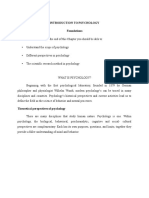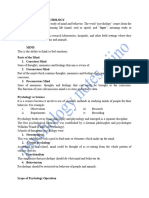HUM 709 (Human Psychology & Environment)
Chapter- 01 : Introduction to Psychology
*Q.01. Define Psychology.
The word 'psychology' came from two Greek words, Psyche (soul) and Logos (Knowledge).
'Psychology is the science of soul'- this belief had been persisted till the end of nineteenth
century. After the concept that there is nothing called soul and all of our behavior is being
controlled by the brain, this definition has been changed. Today scholars define psychology as
the scientific study of behavior and mental processes (Crider, 1995). This is regarded one of
the most rational definition of today's psychology. From this definition we can get three key
words. By comprehending these key terms, we can easily realize what psychology is.
Scientific refers to the fact that the study of psychology is based on information collected
through a set of systematic procedures known as scientific method. A lot of methods has been
devised to collect data of human behavior and mental processes and these are being used hugely
in diverse field of knowledge, from psychology to sociology, from neurology to anthropology
and so on.
Behavior is any activity that can be observed, recorded, and measured. In that sense, individual's
talking, fighting, teasing, sleeping, interacting with others, crying, mourning, aggression all can
be considered as behavior and psychologist has devised a lot of methods to observe, record and
measure these behaviors.
Mental process include thoughts, memories, emotions, motivations, dreams, perceptions,
emotions, motivations, dreams, perceptions, and beliefs. These variables cannot be directly
recorded, measured or observed. But many alternative methods has been devised to do so. For
example, we cannot measure directly the stress. But after measuring one's blood pressure,
perspiration or changes in voice quality, we can easily observe stress. Self report also another
way of measuring the stress. Similarly, dream cannot be observed. But with MRI or other
neurological devices, we can easily measure the depth, nature and dimensions of the dream in a
very scientific way. From the changes in pupil, electron flow in the brain, breathe, heart bit etc,
we can assume many mental processes.
The American Psychological Association (APA) has elaborated the definition. According to
APA, psychology is the scientific study of behavior and experience and the application of that
knowledge to human problems (APA, 1986).
1
�So, in a broader sense, psychology is not only the scientific study of behavior and mental
process, but also a discipline to apply these knowledge in the problem of mankind.
*Q.02. Discuss the goals of psychology.
Science exists because people are curious, because they want to have accurate knowledge, and
because they want to improve their lives. Psychology attempt to meet these needs by setting four
general goals: to describe, explain, and predict behavior and mental processes ad to use the
knowledge gained to promote human welfare. These goals are discussed below:
1. To Describe:
The first and basic goal of psychology is to describe. Describing organism's behavior and mental
processes is the foremost goal of it. From in-depth description, our level of understanding is
improved and we can control the behavior. For example, if someone wants to know the causes of
love, he has to observe a couple for a long time (systematic observation), talk to them for more
clarification (interview), which changes occurs during missing his or her partner (can be
measured by fMRI or hormonal changes or flow of electricity over the brain and so on). After a
long term research, a psychologist can describe why people love and what happens during the
love.
2. To Explain:
The second general goal of psychology is to explain the behavior and mental processes. Once we
are done with the measuring a specific behavior or mental process, we need to explain why it
occurs. After long time observation and examination, psychologists reach to a decision, called
theory. This explains why a specific behavior happens. For example, from a series of experiment
on love or interpersonal attraction, we can easily explain how a person feel attraction to another
one.
3. To Predict:
Once a theory is established, psychologists can predict the future trend of that behavior. Without
prediction, many future events cannot be controlled or behavior cannot be modified. For
example, from a theory named 'Item Response Theory' we can device a tool to predict student's
future performance in graduate level. The students who do very well in Graduate Record
Examination (GRE), they are likely to do excellent also in higher education level (graduate
level). Another example can be drawn from the theory of self esteem. We can easily predict that
the people with low self esteem probably have more social anxiety comparing to those with high
self esteem.
2
�4. To Control:
Once we know the poor marks in GRE exam or SAT, we can predict his poor future performance
in graduate schools. In this situation education psychologist can trace out the causes of poor
performance and try to improve his further performances. Or if a psychologist know that a
person is being suffered from frustration, a psychotherapist can try to heal the frustration with
psychotherapy and counseling.
So these four goals of psychology are the general goal of this discipline. Based on these goals,
the total discipline approaches to its ultimate development.
Q.03. Discuss about the difference branches of psychology.
1. Abnormal Psychology
Abnormal psychology is the area that looks at psychopathology and abnormal behavior. The
term covers a broad range of disorders, from depression to obsession-compulsion to sexual
deviation and many more. Counselors, clinical psychologists and psychotherapists often work
directly in this field.
2. Behavioral Psychology
Behavioral psychology, also known as behaviorism, is a theory of learning based upon the idea
that all behaviors are acquired through conditioning. While this branch of psychology dominated
the field during the first part of the twentieth century, it became less prominent during the 1950s.
However, behavioral techniques remain a mainstay in therapy, education and many other areas.
3. Biopsychology
The branch of psychology focused on the study of how the brain influences behavior is often
known as biopsychology, although it has also been called physiological psychology, behavioral
neuroscience and psychobiology.
4. Cognitive Psychology
Cognitive psychology is the branch of psychology that focuses on internal states, such as
motivation, problem solving, decision-making, thinking and attention. This area of psychology
has continued to grow since it emerged in the 1960s.
5. Comparative Psychology
3
�Comparative psychology is the branch of psychology concerned with the study of animal
behavior. The study of animal behavior can lead to a deeper and broader understanding of human
psychology.
6. Cross-Cultural Psychology
Cross-cultural psychology is a branch of psychology that looks at how cultural factors influence
human behavior. The International Association of Cross-Cultural Psychology (IACCP) was
established in 1972, and this branch of psychology has continued to grow and develop since that
time. Today, increasing numbers of psychologists investigate how behavior differs among
various cultures throughout the world.
7. Developmental Psychology
This branch of psychology looks at development throughout the lifespan, from childhood to
adulthood. The scientific study of human development seeks to understand and explain how and
why people change throughout life. This includes all aspects of human growth, including
physical, emotional, intellectual, social, perceptual and personality development. Topics studied
in this field include everything from prenatal development to Alzheimer's disease.
8. Educational Psychology
Educational psychology is the branch of psychology concerned with schools, teaching
psychology, educational issues and student concerns. Educational psychologists often study how
students learn or work directly with students, parents, teachers and administrators to improve
student outcomes.
9. Experimental Psychology
Experimental psychology is the branch of psychology that utilizes scientific methods to research
the brain and behavior. Many of these techniques are also used by other areas in psychology to
conduct research on everything from childhood development to social issues.
10. Forensic Psychology
Forensic psychology is a specialty area that deals with issues related to psychology and the law.
Forensic psychologists perform a wide variety of duties, including providing testimony in court
cases, assessing children in suspected child abuse cases, preparing children to give testimony and
evaluating the mental competence of criminal suspects.
4
�*Q.04. Describe the main perspectives of psychology.
1. The Psychodynamic Perspective
The psychodynamic perspective originated with the work of Sigmund Freud. This view of
psychology and human behavior emphasizes the role of the unconscious mind, early childhood
experiences, and interpersonal relationships to explain human behavior and to treat people
suffering from mental illnesses. Psychoanalysis became one of the earliest major forces within
psychology thanks to Freud's work and influence. Freud conceived of the mind as being
composed of three key elements: the id, the ego, and the superego. The id is the part of the
psyche that includes all the primal and unconscious desires. The ego is the aspect of the psyche
that must deal with the demands of the real world. The superego is the last part of the psyche to
develop and is tasked with managing all of our internalized morals, standards, and ideals.
2. The Behavioral Perspective
Behavioral psychology is a perspective that focuses on learned behaviors. Behaviorism differed
from many other perspectives because instead of emphasizing internal states, it focused solely on
observable behaviors. While this school of thought dominated psychology early in the twentieth
century, it began to lose its hold during the 1950s. Today, the behavioral perspective is still
concerned with how behaviors are learned and reinforced. Behavioral principles are often
applied in mental health settings, where therapists and counselors use these techniques to explain
and treat a variety of illnesses.
3. The Cognitive Perspective
During the 1960s, a new perspective known as cognitive psychology began to take hold. This
area of psychology focuses on mental processes such as memory, thinking, problem solving,
language and decision-making. Influenced by psychologists such as Jean Piaget and Albert
Bandura, this perspective has grown tremendously in recent decades. Cognitive psychologists
often utilize an information-processing model, comparing the human mind to a computer, to
conceptualize how information is acquired, processed, stored, and utilized.
4. The Biological Perspective
The study of physiology played a major role in the development of psychology as a separate
science. Today, this perspective is known as biological psychology. Sometimes referred to as
biopsychology or physiological psychology, this point of view emphasizes the physical and
biological bases of behavior. Researchers who take a biological perspective on psychology might
look at how genetics influence different behaviors or how damage to specific areas of the brain
influence behavior and personality. Things like the nervous system, genetics, the brain, the
immune system, and the endocrine systems are just a few of the subjects that interest biological
5
�psychologists. This perspective has grown significantly over the last few decades, especially with
advances in our ability to explore and understand the human brain and nervous system. Tools
such as MRI scans and PET scans allow researchers to look at the brain under a variety of
conditions. Scientists can now look at the effects of brain damage, drugs, and disease in ways
that were simply not possible in the past.
5. The Cross-Cultural Perspective
Cross-cultural psychology is a fairly new perspective that has grown significantly over the last
twenty years. These psychologists and researchers look at human behavior across different
cultures. By looking at these differences, we can learn more about how our culture influences
our thinking and behavior. For example, researchers have looked at how social behaviors differ
in individualistic and collectivistic cultures. In individualistic cultures, such as the U.S., people
tend to exert less effort when they are part of a group, a phenomenon known as social loafing. In
collectivistic cultures such as China, however, people tend to work harder when they are part of a
group.
6. The Evolutionary Perspective
Evolutionary psychology is focused on the study of how evolution explains physiological
processes. Psychologists and researchers take the basic principles of evolution, including natural
selection, and apply them to psychological phenomena. This perspective suggests that these
mental processes exist because they serve an evolutionary purpose – they aid in survival and
reproduction.
7. The Humanistic Perspective
During the 1950s, a school of thought known as humanistic psychology emerged. Influenced
greatly by the work of prominent humanists such as Carl Rogers and Abraham Maslow, this
perspective emphasizes the role of motivation on thought and behavior. Concepts such as self-
actualization are an essential part of this perspective. Those who take the humanist perspective
focus on the ways that human beings are driven to grow, change, and develop their personal
potential. Positive psychology is one relatively recent movement in psychology that has its roots
in the humanist perspective.
Final Thoughts:
There are many different ways to think about human thought and behavior. The many
perspectives in modern psychology provide researchers and students a way to approach different
problems and find new ways to explain and predict human behavior as well as develop new
treatment approaches for problem behaviors.




























































































